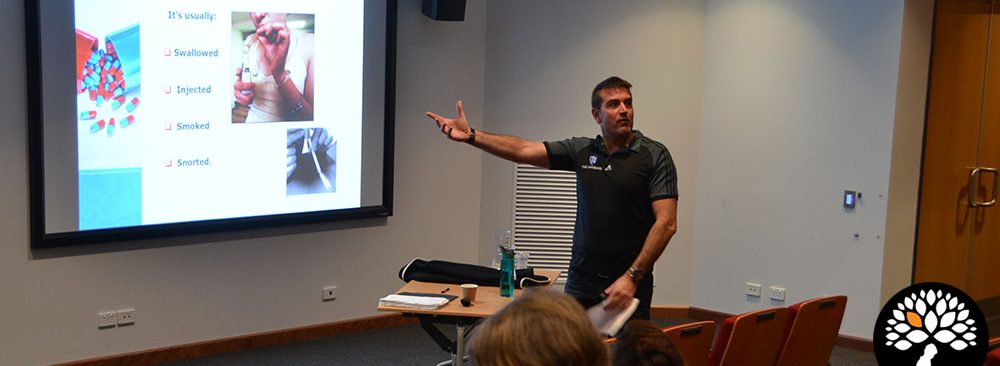P&F Forum with Trent Southworth
There are some difficult discussions that parents need to have, every now and then, with their teenagers.
No one wants to imagine that their sons or daughters will be the ones affected by dangerous levels of alcohol, being picked up for trafficking an illegal substance, driving unlicensed, being in a physical fight where knives are drawn, or experimenting “just this once” with ice.
The P&F Association at Newington knows that parents need expert and accurate advice when broaching these subjects at home to keep the communications open. They invited former police officer and youth liaison worker for many government initiatives, Trent Southworth, to spend an evening at a parent forum in the OBLT. Trent shared years of experience and ‘the facts’ without the drama on some of the most difficult topics for the parents of adolescents.
It was a frank and at times confronting evening—but very empowering for parents who left with some conversation starters that could be useful when asked permission to go to a party or have that, “before you go out tonight, I need you to be aware of…” discussion.
We have shared some points from the evening below:
Alcohol
- Adolescents commence drinking at an average age of 14 years
- Parents are a major source of alcohol supply
- Preloading with alcohol before attending an event is most common
- Energy drinks and alcohol are commonly combined creating the ‘wide awake drunk’ leading to greater consumption and physical risk taking.
Drugs
- Young people are not ‘scared’ of drugs, they are socially acceptable, carry no stigma, are naturally accepted as part of night-clubs and are as accessible as alcohol
- Prescription drugs are common at “pharm” parties where young adolescents mix their parents’ or friends’ pharmaceutical drugs with alcohol
- ICE is so popular because it is 22 times more profitable as a drug that heroine or cocaine, cheap to make, more addictive than heroine, has an ease of ingestion – swallowed, injected, smoked, snorted
- Two types of drug offences that can give you a criminal record – even amongst friends
- Trafficking the physical handing over drugs for money.
- Supply – the possession of drugs of a particular weight
Situational Awareness
- Young adults need help to learn to read ‘where they are’ (the situation) and to make considered choices before trouble starts
- If something is going on that makes adolescents uncomfortable they need to remember to divert themselves—not try to read someone else’s mind. They cannot control another person in a confrontation.
Getting involved in a fight (affray and public violence)
- Increased use of CCTV now shows more clearly whether a person is defending themselves or aggressing in a fight and has increased the numbers of those charged with affray. ‘Self defence’ when you are aggressing is no defence.
- These days due to anti-terrorism legislation a criminal record presents serious restrictions e.g. travel and work visa restrictions as well as employment and character reference issues for a long time.
Risk Management – putting thought into your night out.
- Transport hubs and fast food outlets are the most common venues for young intoxicated people to congregate and be involved in trouble.
- The 3:00 am lock out coincides with cab shift change over and can be a risky time if young people are looking for transport away from venues or a situation.
- Check that phones are charged to 100 % when leaving home to go out.





